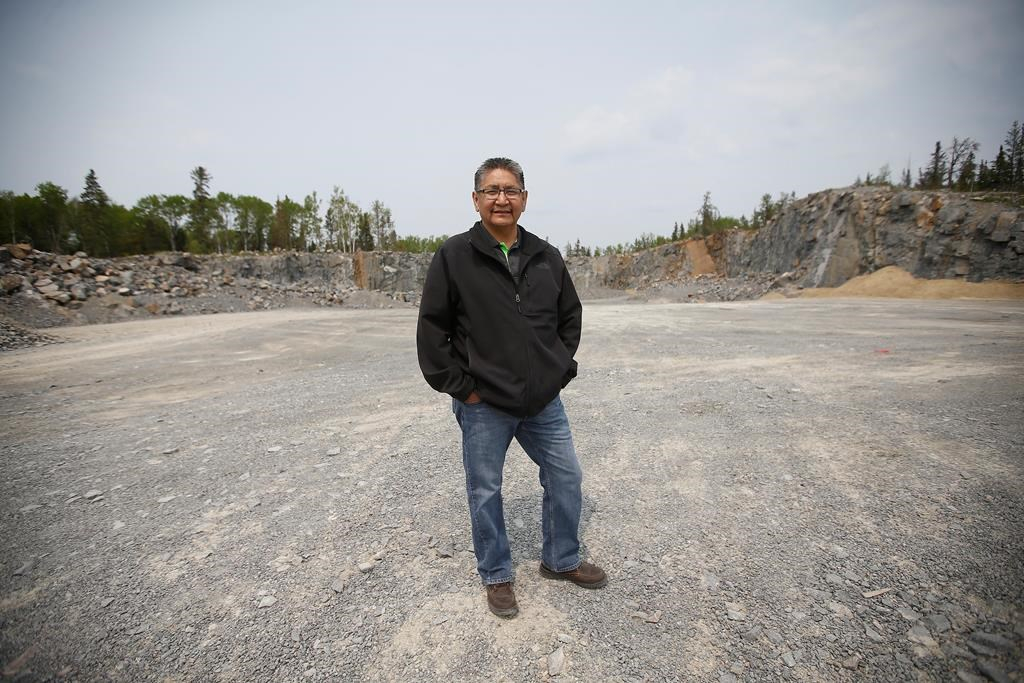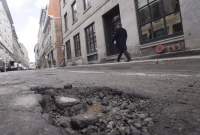Support strong Canadian climate journalism for 2025
For the first time in his life, Chief Erwin Redsky won't have to fight for each small stone that lies along the 24-kilometre road that connects his First Nation to the outside world after more than a century.
He looks down the long, wide gravel landlink and predicts it is his community's path to the future.
"This is Freedom Road," says the chief of Shoal Lake 40 First Nation with a smile.
The road that provides a year-round tie to the Trans-Canada Highway is just the beginning of a long journey toward reconciliation in Canada, he says.
"Shoal Lake 40 has been that model of that broken relationship, and I think Shoal Lake 40 can be that model of that new relationship that needs to happen with Indigenous Peoples of this land," he said in an interview last week.
The First Nation on the Manitoba-Ontario boundary is planning to hold a four-day grand opening for Freedom Road this week.
Shoal Lake was cut off from the mainland in 1915 during construction of an aqueduct that supplies Winnipeg with drinking water. Clean water flows to the capital city while dirty water is pushed to the reserve. Shoal Lake residents have been under a boil-water advisory for more than two decades, one of the longest in Canada.
News reports from the time said the spot was largely uninhabited "with the exception of a few Indians."
Redsky said his First Nation has paid the "price of water" with their health, economy and even their lives.
Members used ice roads in winter and an aging and often unreliable ferry in the summer. During the seasons in between, people risked their lives walking across the ice to get to and from the mainland.
Most have a story of falling through the ice or of relatives who died during the treacherous trek.
The First Nation spent decades trying to negotiate with provincial and federal governments, but their plight was finally brought to national attention with the opening of Winnipeg's Canadian Museum for Human Rights in 2014.
Cuyler Cotton, a policy analyst who works with Shoal Lake 40, said the community's leadership pointed out the hypocrisy of having the reserve's water running through the museum's taps.
Soon churches, students and citizens started to march in support of the First Nation.
"This was no longer an Indigenous story. This was the story of Winnipeg. This is the story of Canada," he said.
Manitoba, the City of Winnipeg and the federal government finally reached a funding agreement in 2016. Construction of the road began the following year.
"Honestly, for me, I had to see it to believe it," said Roxanne Greene, a band councillor and organizer for the opening celebrations.
"Even though we had announcements we were getting the funding, I had to see the shovel hit the ground to believe it."
The first time Greene drove on Freedom Road she cried. As the tires rolled along, she realized the road represents freedom and a new future.
Family members who have left can easily return, a water treatment plant and new school for children can be constructed and summer powwows can be held, she said.
"All of our powwows that we have had previously were always held indoors during the winter because we didn't have the road access."
The long-awaited celebration is to include a day to honour the men, women, elders and youth of Shoal Lake 40. Plans include helicopter rides, a fish fry, a talent show and a concert featuring Canadian blues singer Billy Joe Green and folk rocker Ernest Monias.
The excitement in the community is electric, Greene said, and there's a smile on every face.
Ainsley Redsky, 16, said it feels like a weight has been lifted. She recalled trying to get to a hockey practice in Kenora, Ont., and walking across the ice, holding all her gear, with her grandmother.
"It was really scary knowing that I had to walk across just to get groceries and see other people, see my friends and stuff," she said.
It may be her past, she said, but the road means it's not her future.
"It changed so much for everyone."




Comments
Wilful abandonment of a few "indians". And we claim not to be guilty of genocide? Theft of clean water? Theft of actual reserve land for garbage dumps and devastating mines, and hydroelectric dams that not only rob the "indians" of their sustanence and destroy habitat, but whose benefits and profits will never make their way to the "indians": in any vestige of compensation?
Why isn't there a universal howl of outrage?